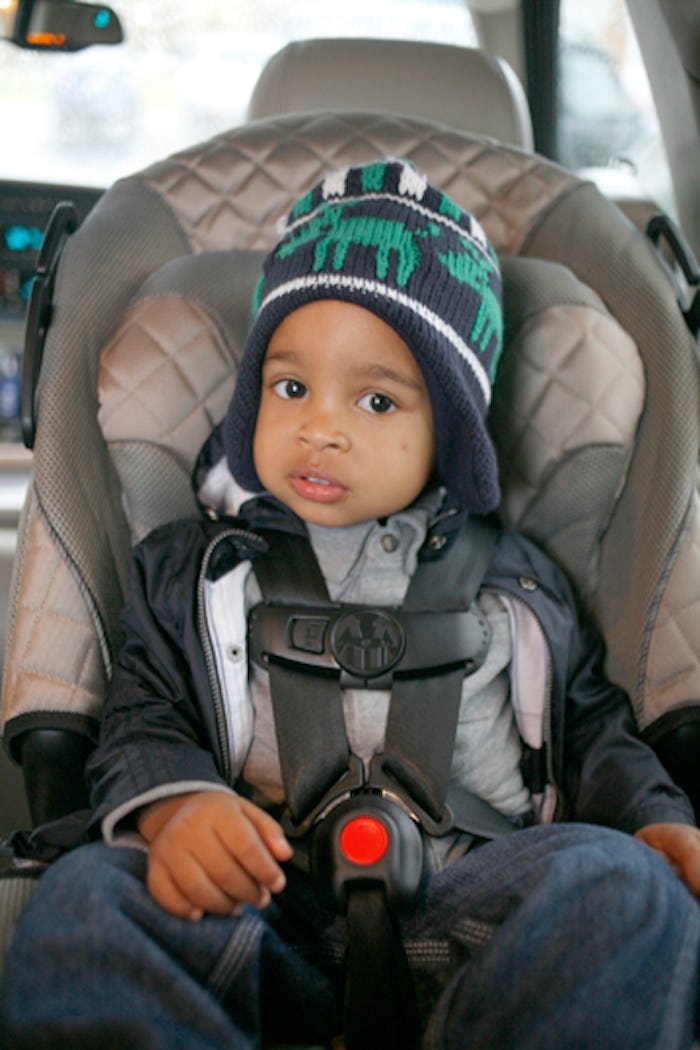Driving hazards are everywhere, and with time, we learn to manage them: icy roads, construction work, the texting idiot in front of you. But the one hazard familiar to every mom is one they don't teach you in driving school: driving while trying to cope with a child having a car meltdown.
Every parent has endured this struggle more often than we care to admit, and it's as dangerous as it is nerve-wracking. According to the National Highway Traffic Safety Administration, anything that takes your attention away from the road is considered distracted driving, which can be fatal. In 2016 alone, nearly 3,500 people were killed as a result of drivers who weren't paying attention.
When you're faced with a child shrieking, crying, and thrashing in the car seat, you'll need to figure out what you're dealing with. Is a tantrum or meltdown? There's a big difference between the two, according to Understood, an organization that aims to support parents of children with learning and attention issues. A tantrum is a frustrated reaction — such as being denied a bag of goldfish crackers — and the child can stop it at will. The Child Mind Institute explained that a meltdown is often triggered by an overload of sensory stimulation, such as a day at the arcade or a night of trick-or-treating in a neighborhood full of creepy decorations.
If you know that you're dealing with a true car meltdown, follow these tips to restore calm again.
Get Off The Road
When you're on the road, your first priority should be safety. If your child's wails are making it hard for you to focus on your driving, pull over to the side of the road, or exit and stop in a parking lot or other safe spot until the situation is under control.
Breathe
Children look to the adults in their life to learn how to self-soothe. But your melting-down child won't learn anything if you're about to explode. Sharla, mom of 7 and woman behind the blog The Chaos and the Clutter, recommended taking a moment to calm yourself. Then try to help your child focus on their breathing, either by putting their hand on their stomach to feel the rise and fall of their breath, or by giving them something to blow on, such as a bubble wand.
Keep Your Voice Quiet
Yelling leads to yelling, so snapping at your child will only escalate the situation, cautioned Parents. Instead, speak calmly and quietly. But don't make the mistake of telling your child to "calm down," advised psychology professor Laura Kastner, Ph.D., to ParentMap. A child in meltdown mode is actually experiencing a fight-or-flight reaction, and trying to rationalize the fear away won't help.
Let Them Cry It Out
When a genuine meltdown is underway, the only remedies are time and space, explained Understood. With the car stopped and your child safely in the car seat, just let them get the tears and rage out of their system. Hug your child if they let you; if they push you away, keep your distance.
Acknowledge Their Feelings
Dr. Kastner explained that a meltdown is a child's way of communicating their anxiety. To help your child manage that anxiety, Dr. Kastner advised, you can verbalize their feelings. Instead of saying, "There's no need to cry" or "We'll be home soon," try "You're feeling awful right now. You're exhausted, and you don't want to go to the shoe store."
Know Your Meltdown Triggers
Keeping a mental notebook of your child's car behaviors will help you spot patterns in those outbursts, advised Understood. Does your little one get especially overwhelmed toward mealtime or naptime? Then pack a snack before you go out, or try to schedule your outings for a time when they're well-rested and fed.
If you're planning a long car trip, try starting out super-early in the morning or just before bedtime, so your little traveler will sleep for a long stretch, suggested What to Expect. Plan your route so that you won't hit rush-hour traffic, and take advantage of rest areas to get out and stretch your legs or play a game of tag. Toting a large supply of just-for-the-car toys will help keep your child entertained and less prone to meltdowns.
